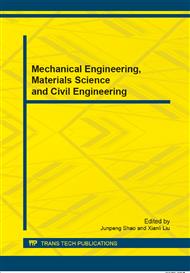p.624
p.629
p.634
p.638
p.642
p.646
p.650
p.654
p.658
Simulation Analysis of Friction Nonlinear for NC Servo System
Abstract:
Friction nonlinear is common in mechatronics system. It can decrease dynamic tracking accuracy, rapidity and relative stability of the system. For NC servo system as an example the simulation analysis is carried out for friction nonlinear. Analyzing friction torque, the difference between dynamic and static friction torques have effects on the system performances. The simulation results illustrate that friction nonlinear mainly affects lower speed track performance of servo system lower. With rotation velocity instruction lower dynamic tracking accuracy and relative stability of servo system more decreasing, the response lag more severity. In the condition of rotation velocity instruction invariable, the bigger the difference between dynamic and static friction torques the worse relative stability and response lag of the system. The paper’s study has the reference value for design and improving lower speed performances of servo system.
Info:
Periodical:
Pages:
642-645
DOI:
Citation:
Online since:
January 2013
Authors:
Price:
Сopyright:
© 2013 Trans Tech Publications Ltd. All Rights Reserved
Share:
Citation:


